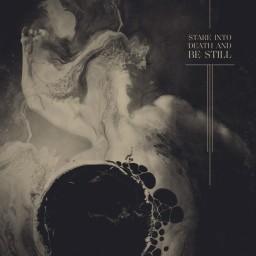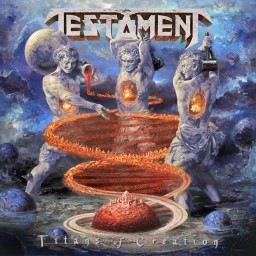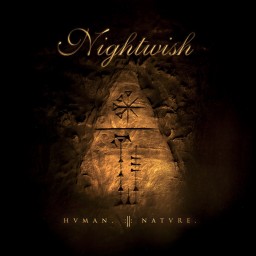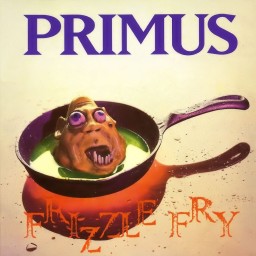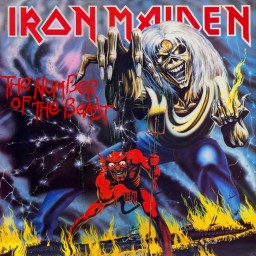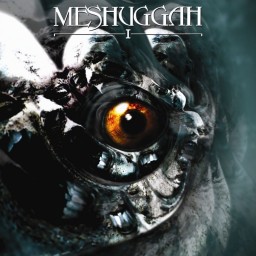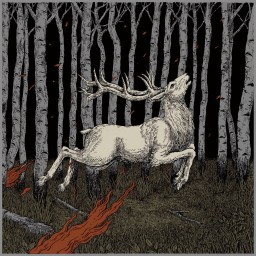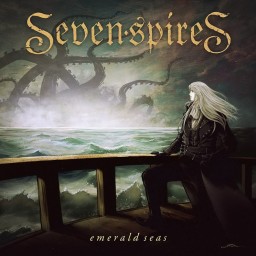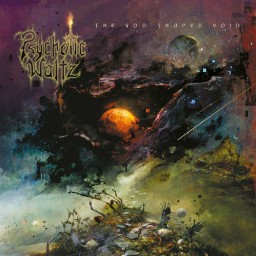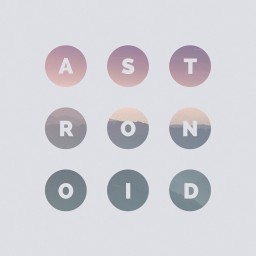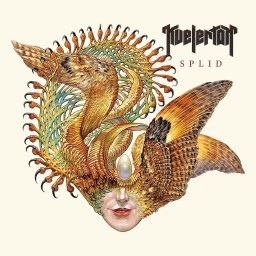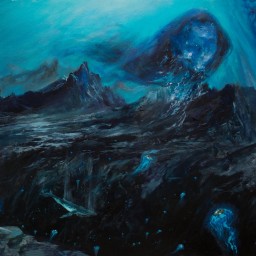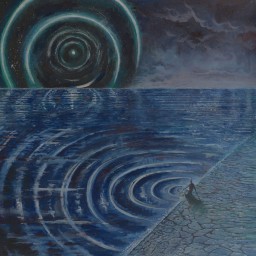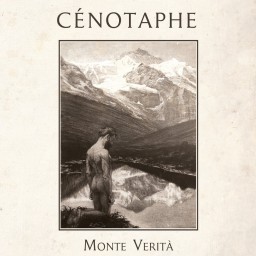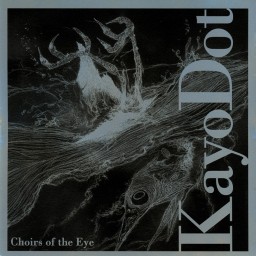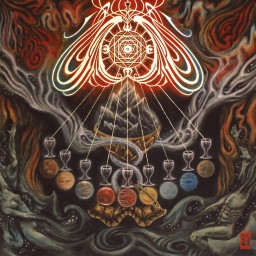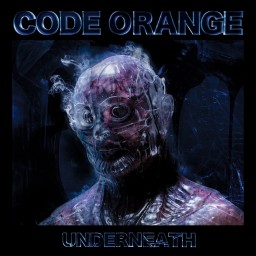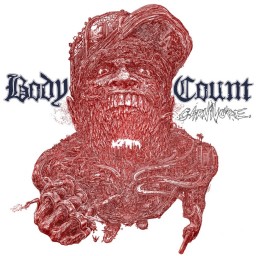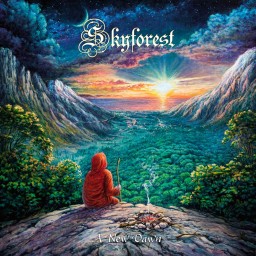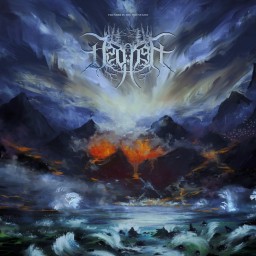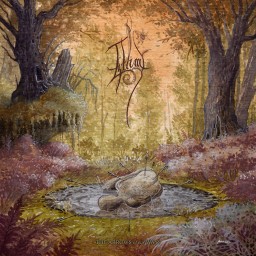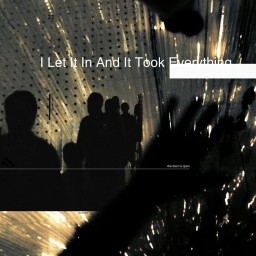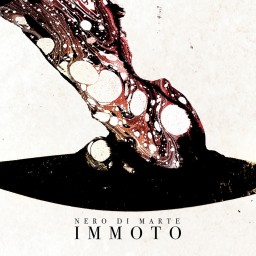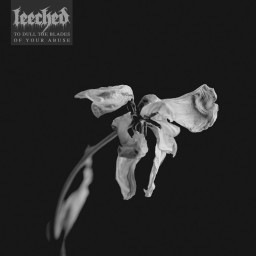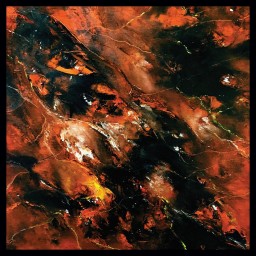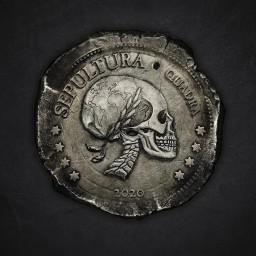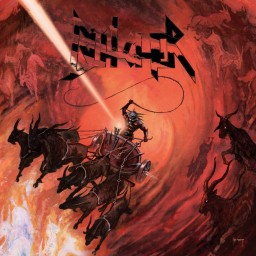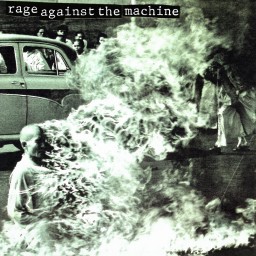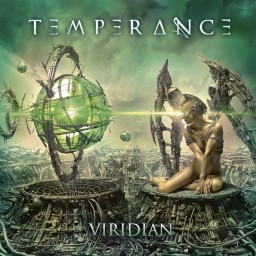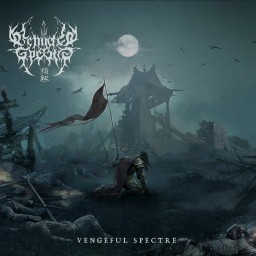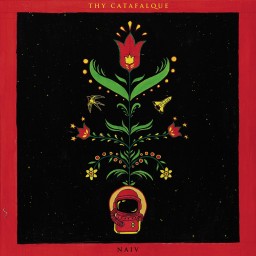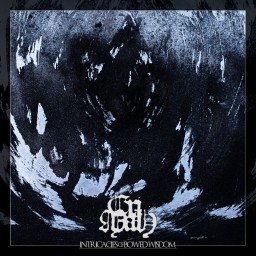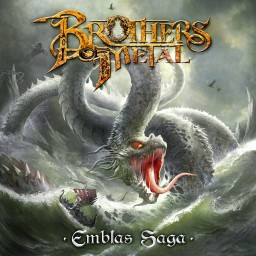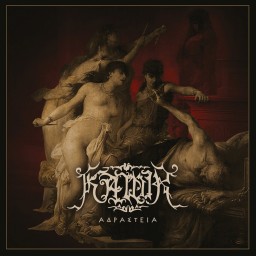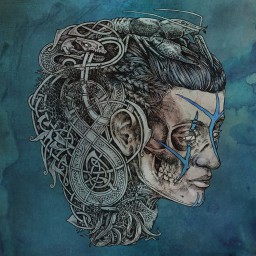Saxy S's Reviews
As most of you know, I have never been truly appreciative or gripped by the technical side of death metal. I have always viewed it as an excuse for bands to play really fast, without any song structure or composition, to go along with some pretty terrible production that ramps up the volume to eleven without justification.
So I was a little nervous checking out Ulcerate and their new album, Stare Into Death and Be Still. I was told to start out by listening to heir very successful 2009 album, Everything Is Fire before embracing this. And I was intrigued. It was still tech death, but not in the traditional sense of the word. For one, it was pretty melodic, and the production didn't sound like ass. But the album was held back by its songwriting.
So it's been over ten years since that album and what has Ulcerate delivered here? A pretty sweet sounding tech death record where the post-metal elements that were only fragmented before, are highlighted with more frequency, even if I can say that this is certainly not my forte.
For starters, the production on this record is spot on. The percussion sounds tasteful and not like a brick wall of sound, drowning out everything that may come in its way with abrasive trigger bass drum. There are slower, atmospheric sections in which the guitar leads have plenty of room to breathe, which are complemented by pummeling heavier sections with some insane drum work from Jamie Saint Merat. The vocals are big and soaring and match with the instrumental palette very well. I think the bass could be more present throughout the entire record, as it could have made some of these tracks much more open and free.
Which does lead me to my biggest issue with this album: the songwriting. While the fine line between progressive metal and technical death metal is very thin, this is still a progressive metal album at heart. And it suffers from many of my quibbles that I have had with modern progressive bands in the past. Specifically, tracks that sound like long form collections of ideas rather than having a universal connector. As a result, tunes that started off with a lot of promise ("The Lifeless Advance", "Drawn Into The Next Void", etc.) lose steam about halfway through and seem to just end without any resolution.
This doesn't make Stare Into Death and Be Still a bad record. The pure sound of this record is some of the best produced and sonically pleasing technical death albums I've heard in quite some time. But if Ulcerate could include some inter-connectivity in these tracks, they could be something truly special. As it is, they are still teetering on the cusp of greatness.
Genres: Death Metal
Format: Album
Year: 2020
I have made the controversial claim in the last few years across multiple platforms that Testament have been making better thrash metal albums in the 21st century than all of their contemporaries in the big four. I don't think anyone will argue that statement with Metallica, but I've seen many people argue Megadeth and Slayer. Fewer people argue for Anthrax, even though I believe that they are closest. I really enjoyed Brotherhood of the Snake from 2016 and with this new album, Titans of Creation... well, it certainly sounds like a Testament album. Which is a good thing, since the album is well produced, has some pretty good hooks on tracks like "Dream Deceiver", "Ishtar's Gate" and "Code of Hammurabi", and the bass actually plays a presence on many of these tunes. Granted, I do believe that the rhythm guitar does take too much presence in the mix, frequently drowning out the low end. And Chuck Billy's vocals are sounding more like Mudvayne's Chad Grey than ever before (take that for what you will).
This album does run long (seems to be a theme with recent thrash metal albums) and at certain moments it can be quite redundant. But overall, I found this album quite enjoyable. It isn't as memorable as Brotherhood of the Snake was, but when comparing to other recent thrash albums from Death Angel and Sepultura, this is still solid. I struggled on this rating, but I feel confident that this album is on the cusp of greatness, but falters due to heightened expectations.
Genres: Thrash Metal
Format: Album
Year: 2020
Nightwish have always been near the top, if not number one, on my list of essential symphonic metal bands. I still stand by Wishmaster as being their best album, and even after the departure of Tarja in the mid 2000s, Annette Olson was able to hold her own, and together they released Imaginaerum, which should go down as one of symphonic metals best records of the 2010s. Unfortunately, something so fine could not last forever. Enter Floor Jansen for 2015’s Endless Forms Most Beautiful, a decent record, but far from the heights this band has seen in the past.
Now it’s been over five years since then and now we have Human. :||: Nature. and man I feel let down by this. For as long and unbalanced as Endless Forms Most Beautiful was, you would think that after five years the band would have fixed those mistakes. But they didn’t; Floor Jansen’s vocal timbre is stronger during her belting portions, but her low end is painfully lacking in bass and grit that Tarja and Annette naturally had. The background vocals aren’t as dynamic as previous records, and speaking of which, Marko Hietala’s howls are practically non-existent. And the hooks just don’t split the difference between the heavy crunch and melodic dominance as the band has previously done, and what Epica is doing right now (please come back to us Epica, we need you!).
And as for the second half of this project, there isn’t a ton to say about “All the Works of Nature Which Adorn the World”. It’s pleasant for sure, and it reminds me in a sense of the direction Panopticon went on the second half of their record The Scars of Man on the Once Nameless Wilderness, but as a long symphonic epic, I would have expected some closure or at the very least, some sort of connecting idea to bring this entire piece together. In short, this piece did not need to be collected together in the way that Nightwish intended.
But at the end of the day, the moments that do stand out are what makes Nightwish such a household name in symphonic metal: anthemic, melodic, gritty, truly “epic”. But Human. :||: Nature. does not have a lot of it. And because the album doesn't feel like an evolution of the last album, I can't help but feel really let down by this.
Genres: Symphonic Metal
Format: Album
Year: 2020
Funk Metal is a genre that has been left behind by far too many metal fans since its glory days back in the early 1990s. One of the genres most niche chambers is also one of its most exciting with its sick bass grooves, infectious melodies and fat production. I say all of this because when it comes to early funk metal, Primus is the band hat I am the least familiar with. I knew a couple of their songs through appearances in video games like Guitar Hero, but everything I heard left me very little interest to check them out any further.
So I went back to check out the debut record from this group and what I ended up finding was something interesting for sure, but probably not in the good way. For starters, where bands such as Faith No More and Living Colour were releasing groove and melodically focused music, Primus were much more experimental. In fact, I kept referring to elements of math rock coming through in the distorted guitar melodies, and Les Claypool's "acquired" vocal timbre that isn't that far removed from black midi's recent album Schlagenheim from just last year. As a result, this album doesn't have many memorable riffs or melodies to pull me back in.
But I can't really take this album seriously because Primus doesn't really take themselves all that seriously either. The album starts with a ride cymbal playing a very familiar pattern that you should easily recognize as "YYZ", but Primus kills it before the guitar riff can enter before the album starts with "To Defy the Laws of Tradition". The song "Too Many Puppies" literally has Claypool alternating with the band where he shouts "Too many puppiiiiiiiiiiies" over and over, which, may I add, is completely unreasonable; there is no such things as too many puppies!
I don't mind tunes like "John the Fisherman" and "Spegetti Western", but the album ends with "Harold on the Rocks"; which is decent, but ends with one of the most played out endings in all of music, only to really end the album with "To Defy", a thirty-eight second coda that goes for a fade out ending. It's jarring and weird, but this is Primus so I wasn't surprised.
In the end, Primus were an interesting group and a unique one for sure, and that is fully on display with Frizzle Fry. Whether or not you end up liking this will be fully dependent on how seriously you take it. And even then that might not be the case! I ended up feeling lukewarm more than anything because I know what the giants of funk metal had to offer and this just didn't live up to those expectations.
Genres: Alternative Metal
Format: Album
Year: 1990
Honest question before we start this review proper: besides the self titled debut record from Black Sabbath (or Paranoid, it's a toss up really), has their ever been a more influential heavy metal record than this one? I'm not talking about the best albums in the genre; the ones that have the largest audience and have reached the most ears. It's really difficult to imagine what heavy metal might sound like today if bands like Iron Maiden never existed, or at the very least, never created The Number of The Beast.
And it is absolutely deserving of all of the attention it has received throughout time, critical acclaim and now me gushing over it, even if I still think that at this point in their careers, Iron Maiden hadn't even begun to scratch the surface of their potential.
And how can I not start by talking about the production and the importance of bass. Steve Harris is one of heavy metal's most underrated and most important bass players. The amount of space that he is given throughout this album is remarkable. His sound is clear and pronounced throughout the album on tracks like "The Prisoner", "The Number of the Beast", and "Gangland". His foundations are superb and is rewarded with some amazing bass solos during the bridge on "The Number of the Beast" or just extended fills before the choruses on "Run to the Hills". When he isn't soloing, Harris is not confined to a basic root note pattern that is being duplicated by the rhythm guitar.
And those guitars sound crisp and precise on tracks like "The Prisoner" and "Hallowed Be Thy Name". Meanwhile, Bruce Dickinson is one of heavy metal's most iconic voices and the way that he howls the melodies to these tunes is fantastic. In time, Dickinson will learn how to sing with composure, but on this album, the loose nature of his timbre fit in surprisingly well in front of the very clean mix of the instrumentals.
As for the songwriting itself, I could go on for days talking about The Number of the Beast. "Run to the Hills" only rivals "Master of Puppets" as heavy metals most iconic choruses. The title track modulates from a quieter odd time signature introduction into a common time thrasher and the transitions between the two is pulled off to near perfection. Even the solos are mixed well. "The Prisoner" does this as well with just enough unique qualities to make it standout from the other. "Children of the Damned" is the album's first great banger, and the album ends with pure melodic bliss with "Hallowed Be Thy Name".
"Invaders" has some decent moments with its wonderfully crafted verse sections, but that chorus is... something. It's a jarring transition that stands out for sure, but not in the way that Iron Maiden was probably intending. It's also the opening track so it can leave a bad taste in your mouth if your not expecting it. I also didn't really mind "Gangland"; I don't see why most people almost universally consider this as the albums lowest point when "Invaders" is still here and the opening track no less.
In terms of criticism, there is very little. One of the greatest parts about the community surrounding heavy metal is that the very best of the best gets propped to the top while underwhelming music is nearly universally shunned. And The Number of the Beast is completely deserving of the title of "heavy metal's most influential album". I know people who don't necessarily listen to heavy metal, but they know Master of Puppets and they know The Number of the Beast. This community is alright in my book.
Genres: Heavy Metal
Format: Album
Year: 1982
Of all the trends that have come out of the ever expanding world of progressive metal, the one that I can't fully come to grasp with is djent. Djent is a genre that can always feel so lazy and devoid of any character and whose only unique trait is the technicality of the song structures, and everyone playing the same part in unison with one another. I have always seen djent as a progression of the very groove laden moments of metalcore.
And with that, we need to talk about Meshuggah and how I have never been their biggest fan. The technical proficiency in the songwriting and performances does not hide the fact that their music is incredibly empty. Which leads us into this EP (perhaps a single) I, a twenty-one minute "epic" that doesn't live up to the expectations that such a word would invoke. Simply put, this feels like a collection of ideas from the chopping board that have been placed together with no attention to how they work; implying no transitions or any sense of greater connectivity.
The first ten minutes of the song call upon those groove heavy elements of metalcore/djent and does nothing with them; their is no melodic flare, no sense of direction, and no inter-connectivity. It makes the first half of this song a chore to get through with nothing to grasp onto. When a solid groove comes in at the 10:30 mark, the song picks up some momentum. Not much, but it's a start! The addition of tremolo "melody" at 11:30 is pretty, but it is never elaborated on further. Instead, we get another technical chugg-chugg-chugg riff at 12:00. I will say though, the track ends very solidly from around 14:40, when we actually get a musical idea, that is elaborated on, expanded and given some girth as the group builds up towards the 17:00 mark, where the melodic phrase is distorted carefully into a heavy, and groovy conclusion.
Meshuggah have always had issues from a production standpoint as well. This is loud and ferocious at times, most notably at 1:30 when the mixing is blown out by Jens Kindman's vocals, not helped at all by open, palm-muted guitar chugging, and Tomas Haake relentlessly attacking his cymbals and bass drum. Outside of this hellish soundscape, the rest of the song does get better, but is still held back by the clipping percussion, mostly in the bass drum, one general problem that almost all djent artists deal with because of the genre's very percussive nature.
As a whole album, I by Meshuggah is not revolutionary. In fact, it further encapsulates everything I despise about modern progressive metal: songs that are way too long that are not deserving of it, heavy percussion built sound, and lacking in any hooks, melodies or phrases to latch onto. It also explains many of my general complaints with djent as a genre and why I may never truly become a fan. Meshuggah will always have an audience for their pure, unrelenting heaviness and dank grooves, but lack any substance outside of that to make them household names in the heavy metal community.
Genres: Progressive Metal
Format: EP
Year: 2004
Olhava are a blackgaze band from Russia and already this album is starting very similar to the Skyforest album from about a month ago. This one is a little bit different however, whereas Skyforest were incorporating symphonic elements into their music, Olhava are giving us ambiance and drone like tendencies throughout Ladoga, their newest album.
And while I do appreciate a good Panopticon clone with some very pretty sounding black metal, it really fails to deliver in many of the same ways that drone metal has failed to keep me engaged in the past. Here specifically through enormous tracks that don't elaborate beyond a single idea. Whereas Panopticon always develops their songs and modulates them through their run time; never allowing them to become stagnant, before bringing all of these ideas together near the conclusion for a chaotic conclusion. Ladoga has very little of that.
While their are some very sweet ideas on display on "Trembling Night", they overstay their welcome and become tiresome after a while. "The Heart Is a Lonely Hunter" does a better job at this with a swell that takes place over an almost painful amount of time, so that the release hits with more gravitas.
The mixing on this album is pretty decent. Like I mentioned off the top, this is black metal very much influenced by the likes of Panopticon; a very muddy mix where no instrument part gets pushed to the front. The vocals are pushed the the back of the mix, the percussion and rhythm guitars are mixed together, while the slower sections do bring in some lead guitar and very solid bass work. When the mix gets a little louder however, the bass does seem to lose some of its grandeur behind the rhythm guitar. Melodic phrasing also seems to take a backseat as well. Track like "The Heart Is a Lonely Hunter" and "Ladoga" have much better second halves after introducing melodic ideas in their softer bridge though.
The ambient sections that are interspersed between the heavier black metal material is present on the "Ageless River" interludes. These tracks call upon heavy synths, guitar feedback residue from the previous tracks and even some field recording, such as on "Ageless River III". These moments are a welcome change of pace following the relentless nature of some of the remaining tracks on this album. But on their own, I don't think anybody will un-ironically return to these moments as album highlights.
This is absolutely an album that can be defined as "dreamlike". This is black metal that you can just listen to and zone out with for over an hour. As such, I can understand why some people might not appreciate this album as much as those (like myself) who are more welcoming of the atmospheric side of black metal, and the stylistic changes that lead it towards blackgaze. Simply put, if you are not a fan of this genre, this album will not change your mind. Otherwise, turn the lights down, roll up a spliff or get yourself an alcoholic beverage, and just let the music take you away.
*EDIT* had to fix a bad autocorrect in the first paragraph which replaced "ambiance" with "abstinence". Yeah this album shows restraint, but not like that!
Genres: Black Metal
Format: Album
Year: 2020
Emerald Seas is a serviceable symphonic metal record from a band that has thankfully made some solid steps in the right direction after their pretty terrible debut record, Solveig from 2017.
For one, the production has seen a fairly sizable increase in quality. It’s still not great; the guitars still sound tinny, the bass is far from existent throughout the project, and the symphonic elements still sound a little slap dash at times. But, Adrienne Cowen’s vocals are now emphasized in the mix and sound good most of the time, and the melodic passages of guitar, such as solos, are also vastly improved from before.
The compositions are more streamlined and memorable and the group does have some pretty decent melodic ideas that they are attempting to portray. Songwriting is better, but Adrienne needs to stop soaring to these highest of highs that she can’t hit with consistency. Most of the time they sound rough, but she’s also screaming on the record so why doesn’t she just do that? Then there is whatever the hell was going on in the bridge of “Drowner of Worlds” and the less time we spend talking about it the better.
A decent improvement from the band, but still a long way to go if they want any chance of catching up with symphonic metal giants like Epica and Nightwish.
BTW, nice lick on “Bury You”. I wonder if these guys have ever watched an Adam Neely video before. Yes, I know I’m a memer, sue me.
Genres: Symphonic Metal
Format: Album
Year: 2020
It has become seemingly more difficult every year to take progressive metal seriously. It seems as if every year, another group releases an album that is simply Dream Theater lite, is arbitrarily tossed into the "progressive metal" category and most people eat it up. I thought the term "progressive metal" was coined for a genre that wasn't normative or derivative; it was forward thinking.
So why are we stuck talking about Psychotic Waltz and their new album, The God-Shaped Void? This album is entirely dependent on nostalgia of other progressive metal records in order to maintain relevancy. Except that's not entirely true, Psychotic Waltz have apparently been around since the mid 1980s and The God-Shaped Void is their first studio release in almost twenty years. This isn't original or memorable outside of a couple of decent hooks on "The Fallen" and "Sisters of the Dawn".
It certainly isn't saved by production, which has the bass playing so softly that any momentum that this band is going for is muted, and not just because of the slow tempo choices. "While the Spiders Spin" is probably the only decent sounding instrumental, since it primarily employs alternate lead guitars and the bass is forced into pulling it own weight. The rest of the album is chugging guitar riffs that double the bass, rendering the low end mostly useless. Percussion is adequate and these vocals are very drawn out and tired. The implementation of flute during the second half is commendable, but the performance is weak. I understand why, but it would have sounded much better if someone knew how to mix properly.
I guess that this album has enough decent moments on it to make it slightly above average, but even then, I feel like I'm being generous.
Genres: Progressive Metal
Format: Album
Year: 2020
So here’s something I didn’t expect. A new album by a band which I have only ever heard from in passing. And I actually enjoyed what I heard. That’s not the surprising part; anybody who knows me knows how much I enjoy my post-metal. The surprising part is how big this group has gotten since their 2016 album Air. This new self titled album is receiving massive critical acclaim alongside the fanbase. So I decided to check it out and see if it holds up to that surprising 2016 debut.
And I’m here to tell you that it certainly does. This is the sort of new fresh take on post-metal that the genre has desperately needed. A knack for melodic songwriting, mixed in with some very stellar clean singing and a towering performance behind the drum kit.
So why don’t I like this more? Well I think that question can be narrowed down into three main parts, which we will get into as they become significant, but let’s start by talking about that songwriting. Many of these tunes have very simple melodies that are usually carried by the lead vocalist, but always have a countermelody, usually played by the tremolo picking lead guitar. And those countermelodies are typically more interesting than the vocalist. Take the opening track “A New Color”, where the vocals sound like they are being forced into the back of the mix. It allows for those sweet melodies and solo to really be heard and admired, same goes for “Fault”. Guitar solos are very few and far between on this album, but when they happen they sound beautiful.
Also on the subject of songwriting, I really love how Astronoid is able to incorporate other metal genres into their brand of atmospheric post-metal, such as the guitar melodies that borrow from progressive metal bands like Periphery on “Breathe”, or the straight up thrash metal elements on “I Dream In Lines” and “I Wish I Was There While the Sun Set”.
And that brings me to my first big problem: the incorporation of those ideas are flimsy. Yes, Astronoid have developed their own sound and I am okay with that, but when you have tracks like “Lost” or “Beyond the Scope”, that attempt to create a hybrid sound in the first half and then return back to the tried and true formula of Air. Many of these ideas just feel aborted for the dreamy atmosphere, it feels like a letdown. It’s the problem that I have with a lot of bands going the way of Imagine Dragons; don’t pull any punches!
Which leads me to my second issue with this record, the use of dynamics. And the fact is that there really aren’t that many at all. Most of these tracks are brooding heavy tracks with all instruments playing at all times to leave the listener in a dream trance, which it certainly does do that, but maybe having a quieter section here and there would make those thunderous sections more worth it. There is some dynamic edge on a song like “Fault”, but as I mentioned before, those dynamics are left behind in the first half for that atmospheric vibe. One of the better tracks on the album is “Ideal World”, as it is more involved than anything else and really requires the listeners attention.
My final big issue with this record is the lyrical content. Mainly that there really isn’t anything to say about it. The lyrics are very minimal and spoken in broken sentences or phrases, which leaves me with very little to compliment. How can I appreciate your lyrical themes if they are pushed to the back of the mix so they can’t be heard anyway, and when I do find the lyrics, they don’t say anything at all? It’s really a letdown and pushes this album out of the territory of greatness.
So, while I do still like the album, there are some major issues with this record that need to be addressed in the future. Which beg the question: where does the band go from here? Seriously, I’m genuinely curious. Because a lot of atmospheric bands have to try something new in order to stay relevant without becoming the music that I use to help me sleep at night. Astronoid is fortunate to have melody in their back pocket and a great percussionist to keep them going for a while. If Astronoid wanted to create a straight up black metal track, they could do it, they just need to work at staying on track. And add in some more direct storytelling, maybe finding some outside help, and you would have a progressive metal band that could be a force to be reckoned with. I would bet money on this band being huge very soon.
Genres: Post-Metal
Format: Album
Year: 2019
I like to think that I am pretty well versed when it comes to hardcore punk music. So what happens when you take the heavy aggression of hardcore punk and add a black metal tinge to it? Well you'd probably end up with a band like Kvelertak. This is my first time ever stepping into the genre that I will dubiously call "Black 'n' Roll" so I was hoping for an interesting experience.
And what I ended up getting was an album that I was mostly expecting and mostly enjoying. This is aggressive, hardcore punk with just enough tonal dissonance and instability to make it a pretty interesting hybrid of the two genres.
To be fair however, it seems disingenuous to call this album a hybrid album, since Black Metal's influences are derived from hardcore punk. This album truly feels like one of the next logical steps for the genre to take in the vein of classic Black Metal artists like Venom. It has pummeling riffage, the bass, while not a prominent force on this record, does provide a much needed ground work for the rest of the ensemble to carry on. The percussion work is mostly standard timekeeping, occasional fills and sometimes quick thrash time or blast beats. While the vocals will be the most difficult to appreciate, depending on where you are approaching this album from. Given that this is the Metal Academy, I'm sure most of us don't mind. They are strong, powerful vocals with a crisp and clear delivery, making for some excellent, emphatic moments.
When the album takes a clear black metal pivot, it is sparse, but effective. The guitars take on your traditional tremolo picking patterns, usually atonal, while the drums pummel away at some blast beats. Usually, I might criticize an album for having them feel out of place, but on multiple playthroughs, they didn't seem to bother me. The transitions are very well executed. I also really enjoyed the bridge on "Fanden ta dette hull!" paying tribute to another of black metal predecessors: thrash metal. I know it seems crazy to say this, but this genre may be as close as we get to "mainstream black metal"!
It isn't perfect though. Mostly in the production. I noticed the sound of the percussion, specifically in the cymbals, sounded very buzzy and really took me out of the experience from time to time. Also, this album does tend to drag a little long near the end. The last two tracks in particular. They are still good songs, but they seem to run out of ideas after a while and the group comfortably rests in a black metal sound the rest of the way.
But overall, I was impressed by this novel sound. I can tell it is still in the early stages of development as Kvelertak tries to figure out how much black metal is too much, and that may be a fine line that this group as well as others may never find. But still, props to the band for trying and creating a pure, raw, hardcore punk album.
Genres: Black Metal
Format: Album
Year: 2020
I don't typically do Funeral Metal or Depressive Suicidal Metal because most of the music found within is exceptionally nihilistic, but lacking any of the higher stakes. But the newest album from Drown, the brainchild of Markov Soroka has been received favorably in the early stages, so I decided to check it out.
Okay, so this album is the continuation of Unsleep, a project released in 2014 that supposedly tells the story of drowning at sea as our main characters (Mother Cetacean & Father Subaqueous) watch and we get their reaction as they lose their son. One thing I will say right out of the gate is that while Subaqueous is certainly the harder album to digest, I also think that it's slightly better than Unsleep. The songwriting has vastly improved and the instrumentals are able to tell an ever evolving story through melodic motifs and phrases repeated and modulated. And this isn't just through the individual movements, but across the two parts as well. I was very impressed to hear how the opening idea from "Mother Cetacean" was modulated and contorted into the bridge of "Father Subaqueous". I also enjoyed how, more so on "Mother Cetacean", the track picks up intensity through it's run time, making for what could be a painful listen, a lot more bearable.
However, there is something to criticize and that is the vocals. These tracks are delivered in the third person perspective, with the exception of the final lines of "Father Subaqueous". As a result, I don't understand why Soroka uses filters on his vocals to make him sound like he's underwater. If this was a first person telling, fair enough, but I had a hard time understanding anything that Soroka was saying. When I look on recent death doom metal albums that I have enjoyed (Songs From the North, The Boats of the Glen Carrig, The Death of Gaia, The Plague Within) each album has clear, crisp vocal deliveries from their vocalists. I would expect on a funeral metal album like this that vocals would take prominence, just as they would from any Emo band or Depressive Suicidal Metal.
As a result, I found this album to be a little tedious. Not bad by any stretch, but not an album you can just pick up and play. And as I mentioned off the top, it is lacking in any of the higher stakes, since it is told from a third person perspective, rather than being delivered straight from the source. Still, the music is strong enough on its own to save this album from mediocrity. Tread lightly upon these waters.
Genres: Doom Metal
Format: Album
Year: 2020
I really enjoyed how this album flowed and how it was able to sound unique to this new group. I can hear a spattering of death metal elements through some of the guitar riffs and the lead singers vocal timbre, but it sounds fresh and exciting, not in your typical melodic death metal sense. I've seen people bring up elements of psychedelic rock and while I can somewhat agree, I think that Post-Metal is probably the more accurate term for this. There are even a handful of slower, brooding sections that could be an extension of the death doom genre, which I also appreciated.
The sound of this album is crisp and poignant. The bass is emphatic at driving the tunes home and the melodic and harmonic phrasing of each tune is commendable. Don't have all that much to say about this except that it is an excellent post-rock/progressive metal album that has been well received early on. Highly recommended.
Genres: Progressive Metal
Format: Album
Year: 2020
I was very impressed from what I heard from Fluisteraars and their newest album, Bloem. This ensemble out of The Netherlands is playing some truly gorgeous sounding black metal, which some excellent mixing to boot. I am all for the exceptional bass presence that is on display here. The guitar melodies are soaring and emphatic, and while the vocals aren't the greatest, they do provide some decent counter-melodies to the lead guitar.
That being said, this album does have one pretty alarming problem; it's snooze factor. While these tracks are very nice and provide an excellent sound palette, some tracks ("Eeuwige Ram" and "Maanruïne" in particular) do carry on with just one idea for an extended period of time without doing anything with them. As a result, these tracks do get quite repetitive and can lure you into a dream state with the albums atmosphere.
That being said, good production and musicianship does make up for it in some places, so I can't not recommend this for those looking for a nice atmospheric black metal adventure. Or if you are looking for something to help put you to sleep.
Genres: Black Metal
Format: Album
Year: 2020
Well I'm finally caught up on new mainstream releases and finally have some time to relax and listen to some of the best that metal supposedly has to offer. I mean it's not like I have anywhere to go at the moment! The first album I listened to was a debut record from French black metal band, Cénotaphe, and I found this album to be pretty bland and poorly mixed.
For one, there were plenty of moments throughout this record where the guitar, bass and drums are lost and out of sync with one another. My guess is that it makes for a more raw experience, but to me it just sounds wrong and that Brume wasn't listening to his own parts while recording the rest. As for the vocals, I am not much of a fan. These screeches are more like howls and the singer seems unable to hold his breath. There are a couple of clean moments on the record, but they are typically sung as a plainchant and it doesn't sound very interesting or unique.
The songwriting is pretty lackluster as well. There are ideas here and sometimes they are exemplified, but too often these ideas are only used as an introduction before transforming into pretty standard black metal riffage. These contrasting ideas never feel like they are molded properly and just give me the impression that most of these songs were half finished, so they decided to add a completely new one to increase the track lengths.
This album feels much longer than the forty-six minutes that it is allotted. Even the good ideas that are here don't really stand out among the best in black metal so far this year. It feels very pedestrian and might intrigue you if you enjoy the traditional black metal sound, but not for me.
Genres: Black Metal
Format: Album
Year: 2020
Kayo Dot is the brainchild of Toby Driver and Choirs of the Eye is the debut album from the group, released in 2003. I did not become familiar with the group until very recently with their 2019 album Blasphemy. And I was completely underwhelmed by what I heard. For one, the bass was non-existent, making the really long tracks on that album feel even longer, since they had no forward momentum.
Now I can say that when the band started out, they had less of that problem. But at the same time, they were very much out of the mainstream as this album is jarring as hell! There is a lot of dissonant tones and ideas that are recurrent throughout the album in which, if you are not prepared for them, can make for an uncomfortable experience. But I do believe that the band was able to pull off most of it pretty well.
For starters, when this album gets heavy, whether it be near the outro of "The Manifold Curiosity" or basically the entirety of the finale, "The Antique", Kayo Dot can throw down some impressive grooves and ideas, even if that might not be their end goal. The instrumental work is stellar on this record, the incorporation of horns and strings as melodic instruments creates a welcome change of pace, and the bands control of dynamics is impressive. And the production doesn't get in the way of the dynamic swells either; they feel natural and rewarding.
While I don't think that there is one particular "bad" song on the album, the second track, "A Pitch of Summer" does highlight most of this albums most perplexing moments, such as the use of extended pauses that constantly made me wonder if something was wrong with my playback device! Or the very minimal development of ideas. Granted, this happens less throughout the rest of the project because "A Pitch of Summer" is the shortest song, but it takes a painfully long time for "Marathon" to get started and it could have been trimmed down.
Am I in love with Choirs of the Eye? No. While the genre of "Avant-Garde" music is up to interpretation, there are plenty of ways in which the genre can be executed well. And Kayo Dot deliver one of the more unique heavy metal records you may ever hear. However, the reason it is called "Avant-Garde" is just that: it's vanguard. It's a plethora of different genres (not just metal) all mashed together into one. And you're enjoyment of this record will be if you can handle the madness.
Genres: Avant-Garde Metal Post-Metal
Format: Album
Year: 2003
Spectral Lore & Mare Cognitum are both solo black metal artists who decided to team up and create an absolute mammoth of a record in order to create a modern, metal version of Gustav Holst’s The Planets.
And yes, that comparison does have a lot more in common than you think: Mars is subtitled as the “Bringer of War” and “The Warrior” in their respective suites and in both cases, it is the loudest and most aggressive piece in the work. Venus is the “Bringer of Peace” and “The Priestess” respectfully, and while both parties subtitle Neptune as “The Mystic”, it is clear that Spectral Lore & Mare Cognitum took a lot of influence from Holst’s Neptune in the creation of Pluto, from the ethereal nature of the entirety of Part I, and of course, the outro to Part II.
Beyond the comparisons, this album is a lot of work. And it has to do with the simple fact that there are two different artists here making two very different styles of black metal. Spectral Lore is making music with more blackgaze tendencies, while Mare Cognitum makes music that is more technically demanding and perhaps, even more melodically driven. As a result, if I ever do come back to this album again, it would be for the Mare Cognitum tracks over Spectral Lore, as Spectral Lore’s tunes are a lot less interesting.
That being said, “Pluto (The Gatekeeper Part II - The Astral Bridge)” brings both ideas together into one grand finale, but the jarring change of pace with the electronic to acoustic percussion, high screeching vocals to devilishly low gutturals, and soaring tremolo strumming guitars to downtuned, chugging riffs, makes for a very disjointed closer, even if I do appreciate what the duo was going for here.
This is an album that has a lot of excellent ideas, but only some of them are executed all that well. I know that I will be checking much of Mare Cognitum’s back catalogue after this, but I can't say the same for Spectral Lore. The album’s length along with alternating styles certainly make this feel like an intergalactic journey so props for that. But for me, I’ll remember this trip for it’s memories; I don’t think I’m going to travel all this way again for a while.
Genres: Black Metal
Format: Album
Year: 2020
Code Orange are a metalcore band from Pittsburgh who made waves on my radar back in 2017, when a number of rock/metal critics who I follow rated Forever surprisingly well; even going so far as to include it on their respective AOTY lists. But then I came here and noticed it was far more controversial than it would seem. So I checked it out… it was pretty good. Granted, I was certainly not the target audience for that album.
And so when I heard Underneath, I thought that the album could have been better and was absolutely a step down from their previous effort. Why? Because Code Orange seems to have doubled down on the electronic/industrial elements, and it does make for a fairly enjoyable, if somewhat jarring project.
And this group is playing into two styles. The first is the heavy breakdown influence of metalcore, and an industrial element not dissimilar to a band such as Fear Factory. And I like the Fear Factory influence on this album more, simply because the industrial elements are not pushed to the front of the mix to create peak dissonance. I would say the same thing about the worst moments on clipping.’s last album There Existed An Addiction To Blood.
I prefer this music when (I assume) Reba Meyers takes over lead vocals because those tunes typically have a distinctive hook or melodic idea that is then contorted into some pretty nasty stuff. I like it more than when (again, I assume) Eric Balderose is on lead as the songs feel more like heavy mathcore such as Converge; kind of ironic since this album is not produced by Kurt Ballou.
I didn’t mind this album, even though some of the production choices infuriated me. However, unlike what I said in my review for I Let It In and It Took Everything by Loathe a few weeks ago, this album could have been much better and streamlined if the band knew how to incorporate both of these sounds together into the same tracks, rather than isolating them into their respective tracks.
Genres: Industrial Metal Metalcore
Format: Album
Year: 2020
Every few years I am always perplexed when I see a new Body Count album released and the leadoff single/cover get tossed into every new metal playlist on spotify. And I wonder how they even got there. It was quite obvious to me that during their 2010s revival and the album Manslaughter that this was a comedic act; not meant to be taken seriously. They modernized the song “Institutionalized” by the Suicidal Tendencies for god sake!
Anyway, here’s the album Carnivore and I can tell that albums like this are gonna get eaten up by the meatheads of the world with its over the top hyperviolence. But then this album has two very strange moments of contemplation. The first being a cover of “Ace of Spades” by Motorhead, the other is “When I’m Gone” featuring Amy Lee, dedicated to Nipsey Hussle and the overall message of the song is bizarre. I guess in the context of the album it fits, but it isn’t much of a dedication song. More of a “You’ll only care about me when I’m dead” song, a very selfish, nihilistic way of looking at it.
Jamey Jasta does some guest vocals on “Another Level” which did not fit at all over the slow groove, he would have fit better over a song such as “No Remorse”. An Ice-T as a performer is very bare bones with this hyper aggressive beatdown stuff. Not reinventing the wheel in any way, but again: novelty act. They don’t need to invent anything.
What it all boils down to is a pretty weak album overall. The album is called Carnivore because it is the blandest meat and potatoes metal album I’ve heard in quite some time. No need to feast on this meat for very long.
Genres: Alternative Metal Thrash Metal
Format: Album
Year: 2020
I don't listen to very much in the way of this brand of virtuoso, neo-classical guitar music, but I have heard enough of it that when I saw this album appear as one of the monthly listens, I felt I had to review, however brief this may turn out to be.
Jason Becker's debut album was released when he was only nineteen years old and I can kind of tell. While his performances are very impressive, showing off an unprecedented virtuosity of his instrument, the songs themselves are little bit more than your standard power chords, occasional synth backgrounds, very simple percussion, and a bass that could have recorded in a different studio, in a different country! All the focus is on Becker, but as an observer, it can get overwhelming at times; all I'm saying is, an instrumental break would be nice every now and again.
I do really enjoy how this album manages the neo-classical elements, specifically in the compositions. Becker and the rest of the ensemble know the basics and even some more of the advanced harmonies of classical music; lots of sweeping dominant/diminished arpeggios as well as a real understanding of major/minor chord progressions. That being said, I do have to criticize the first half for not really getting how these sorts of showman pieces work in a truly classical idiom. Later on, on tracks like "Eleven Blue Egyptians" and "Opus Pocus", an actual melodic idea is formed and gives Becker something to play off of rather than just wankery. But the first half, tracks such as "Perpetual Burn" and "Mabel's Fatal Fable" are not memorable in the slightest. And while I do like what Becker was going for on "Air", that song too devolves into a wank fest with no melodic momentum.
The ability was there and on full display with this album, but honestly, this feels like what every kid who just got accepted to a college/university jazz programs solos sound like: lots of notes, not a lot of substance. If I'm comparing this to the virtuoso, neo-classical guitarists that I know more about (Steve Vai, Eric Johnson, Paul Gilbert), I could take it or leave it.
Genres: Neoclassical Metal Progressive Metal
Format: Album
Year: 1988
Well, it was only a matter of time until we had to talk about this. That just comes with the nature of the Gateway clan I guess. Last months album challenge for the Gateway was S/T from Rage Against the Machine; the precursor. And today we're talking about the OG. Let's talk about nu-metal.
I spent a lot of time during my adolescence listening to this sub-genre of metal as it was just accessible enough that it did receive quite a bit of radio airplay, and it sounded really heavy in comparison to other mainstream rock of the time. Korn were one of the first groups to really define this new genre and they are still making music to this day. Unfortunately, they were one of the groups that I liked the least. And going back to their self titled album, it all but confirmed what I already knew about this band.
The rattling production is flat out intolerable! It sounds like someone partially loosened one of the screws in either the bass or his amplifier, and then got Fieldy to play. The percussion sounds like trash (literally), as if David is just bashing on some garbage cans. And Jonathan Davis' vocal timbre is... an acquired taste. He would later go on to influence the vocal timbres of early Mudvayne and Skindred (remember them?). At least in Mudvayne's case, Chad Gray updated his vocals on later albums, as well as his work in HELLYEAH.
As an overall sound, I like to think that their are two schools of nu-metal; the dank metal influenced by bands like Korn, and the cleaner stuff that was popularized by bands like Disturbed and Linkin Park. On this record, we are clearly in the former category, as many of the songs here sound like rough drafts. Jonathan Davis is terribly out of tune when he's singing and his screams sound more like whimpers. The guitars are out of time with the drums & bass, assuming you can hear the bass at all beyond the rattling that I mentioned earlier.
From a lyrical standpoint... what is there to even say? This is 20 year old's singing about angsty teenagers who complain about their parents not giving them their allowance money, even though they did nothing to deserve it. This album's worst moments of this happen on "Clown" and "Faget", while "Shoots and Ladders" could have been saved by the bagpipe instrumental, but then Davis start reciting children's nursery rhymes, further confirming my assumption of who this music is for.
Yeah the debut Korn album is bad... like really bad. It isn't melodic in any way, the production is laughable, Jonathan Davis can't hold his own over these instrumentals, and the lyrical content is laughable. The fact that THIS group threw down the supposed first nu-metal album is pretty disappointing. Zach de la Rocha sounding f*cking pissed when he was angry on the self titled RATM album, and he also benefited from having some fat hooks and grooves. This album has none of that. Even Slipknot, for as much as I can't stand them, albums such as Iowa and The Subliminal Verses were more likable than anything Korn has ever made. Their refusal to grow up and given their reputation in the genre, I now see why nu-metal gets an almost universally negative reputation.
Genres: Alternative Metal
Format: Album
Year: 1994
I wish I could come on here and tell you guys how much I loved this new album from Skyforest. They are a blackgaze band from Moscow who released their newest album, A New Dawn a couple of weeks ago. There are a lot of great ideas on display here. Unfortunately they are held back by some really cheap sounding production.
The rhythm and acoustic guitars sound tinny, the percussion has issues all over the place, but the ones that stand out for me are the rattling hi-hat and toms that sound like the drummer is literally hitting garbage cans. And the singers… bless the singers for trying their best, but whenever the vocalist goes into their high screams, they are so poorly mixed and quiet, I started questioning whether or not the vocalist wasn’t whispering like they did earlier on in the record!
But I won’t go without talking about the good stuff. The melodies in both the clean vocals and lead guitar are very solid. The bass lines are very good when they are separated from the rhythm guitar. The clean singing between male and female leads is respectable. And the compositions themselves could have been magnificent if it had been mixed better all around.
To put it bluntly, this is the kind of album that hurts to review, because I can tell this group has potential to be great, but makes some baffling decisions and places them right at the front. If you want epic sounding black metal with symphonic elements, try the newest Dzö-nga album Thunder in the Mountains instead. This isn’t all bad, but it deserves a lot better.
Genres: Black Metal
Format: Album
Year: 2020
Let me take you back to 2004, a year in which two monumental sludge metal albums came out, but took the genre in two very different directions. The first is Mastodon and their album Leviathan, one of the most accessible and universally legendary albums of the 2000s, perhaps even the entire 21st century at this moment. On the other side you have ISIS and Panopticon, an album that dives more into the post-metal and atmospheric sides of doom/sludge metal. Both albums are heralded as all time greats by those who have heard them, so this begs the question, who was more influential?
Well if we go from a mainstream point of view, that answer is Mastodon. They have been the flag bearers for modern metal in the 2000s and even followed up their 2004 album with one that is objectively better with Crack the Skye. ISIS are coming off of one great album with Oceanic and deliver atmospheric bliss.
As a result, their songs are long and drawn out as opposed to many of their contemporaries, making their music much less accessible, but influenced many great similar sounding post-metal bands later on, including The Ocean and Cult of Luna. But much like their step siblings in the black metal scene, ISIS are much more for creating an environment that is brimming with melodic ideas and phrases from the lead guitar, vocals, and even bass lines (on a track such as "Wills Dissolve")! I love how the album begins with "So Did We", an excellent indicator that this isn't going to be a dirge-fest. When "In Fiction" comes on later in the track listing, the vocals don't enter until about half way through, however the slow build to a release is pulled off so well. A true indicator that this group has been focused on creating anticipation, as well as re-routing the listener's expectations.
Now when you have an album like this, where dynamics are key, it becomes integral for the production to sound really good, and this sounds excellent. The guitars always seem to draw albums like this back, specifically modulating from soft to loud. With this, the guitars sound full and gritty, without sounding like they have simply been turned up behind the mixing board. The drums are also sound very developed as well; like with the guitars, dynamic control from Aaron Harris is on complete display instead of feeling like simply being turned down by the producer later on.
I will say that like with many post-metal albums in a similar vein to this one, while the extended sections do sound nice and build up to some incredible highs, this album (and the individual tracks themselves) can get a little tiresome after a while. I really enjoy "In Fiction", but it is very easy to get lost in the extended intro as it builds in what feels like a snails pace. Also, I do wish that the group would have implemented Aaron's vocals more than they did; it would have made for some incredible payoffs on tracks such as "In Fiction" and "Altered Course".
I really do enjoy when heavy metal groups decide to take a pre-existing genre and add progressive/post-metal elements to it and Panopticon is just that. Although this would have been expected at the time considering the sky high expectations following Oceanic. There is a reason why this album is revered in the heavy metal community by those willing to take the dive in. This is an experience that should not be missed.
Genres: Sludge Metal Post-Metal
Format: Album
Year: 2004
The newest album from Boston based symphonic black metal band, Dzö-nga, has all of the makings of one of this year's best heavy metal albums. There is so much to love here. The compositions of these songs are effortless, blending clean and harsh vocals, leads guitar, flutes and strings, not to mention the fantastic dynamic contrast between loud and soft sections. I really enjoyed how the band was able to build through the first half of “The Death of Minnehaha”, slowly adding new elements to a previous idea and making it grow in intensity.
“Heart of Coal” and “Flames in the Sky” both have some fantastic melodic hooks to come back to, making them instant standouts for me. The mixing is stellar, as it deals with the heavy guitar work that owes a lot to symphonic/power metal, while the melodic touches from the strings, flutes and other instruments are wonderful. The bass lines are fruitful and forward thinking, the percussion work is pretty crazy at times, and the tour de force of clean female vocals and harsh black metal screeching makes for a wonderful dichotomy and allows for the group to be able to make all of these crazy transitions without having any of them sound forced.
If I had to criticize this album for anything, the album does feel like it ends abruptly with “The Death of Minnehaha” fading out rather than a clean finish. Also, while the penultimate track “Starlight, Moonlight, Firelight” does sound very nice, its sole purpose feels like a musical reprieve; allowing the listener to catch their breath before the eleven minute closer. But these are just minor quibbles on what is an excellent album. If you are a fan of the symphonic or folk sides of atmospheric black metal, then this will be essential listening in 2020. Don’t leave these mountains untraversed.
Genres: Black Metal
Format: Album
Year: 2020
The Arrows of Our Ways is the debut album from Izthmi, an atmospheric black metal quintet out of Seattle, and I enjoyed what I heard out of this opening display.
Their sound is hard to explain; I do hear some influence from a band such as Saor, but without the folk/pagan effects. Some of the more traditional black metal sections reminded me of bands such as Harikari For The Sky. Regardless of who they sound like, this album is produced very well. The wall of sound guitars are very pretty and the lead guitar parts are effective at breaking up the wall of sound sections and the vocal howls. Speaking of the vocals, Jakob Keizer has one hell of a performance on this record. I really enjoyed the sound of his low gutturals that take influence more from death metal. The way that they are used in between passages of fast tremolo picking blast beats is stellar.
I do wish this album had a bit more of a bass presence; having two guitars is great when one takes on a lead role, but most of the time the rhythm guitar is just playing root passages, leaving the bass in the back. Also, while the clean singing sections aren’t distracting on “Useless Is the Song of Man, From Throats Calloused by Name”, the fact that it’s the only time on the album clean vocals are used, makes them feel like an afterthought. There were also a couple of moments on that song as well as “The Arrows of Our Ways” where Keizer’s vocals cracked at the ends of phrases, something that could have been easily fixed.
But as it stands, I really liked this. The melodies are equal parts crunchy and pummeling, but also soaring and beautiful. Give these guys a chance and check this out. Can’t wait to hear what comes next.
Genres: Black Metal
Format: Album
Year: 2020
I figured that I would rewrite this review considering the first review I did of this album was after I listened to the record while on painkillers and it turned out very poor. So Loathe, an English based trancecore(?) band whose defining feature is their incorporation of Deftones influenced shoegaze/alternative metal sounds.
And on their newest album, I Let It in and It Took Everything, the band seems to be trying to split the difference between abrasive guitar riffage that isn’t that dissimilar to what Daughters did on their last album, and the aforementioned Deftones sound. And they have the sound down to a tea, to the point where lead vocalist, Kadeem France, even has Chino’s unique vocal articulation. And I do respect what this band is able to do with these influences and try to turn them into something new and exciting.
However what I said before still stands and that is that this record is all over the place in its framing and mood. At one moment, it frenzied and hectic and at others, calm and collected. “Aggressive Evolution” has these ideas spliced together into one song, let alone between the different tracks! Songs such as “Screaming” and “New Face in the Dark” balance the two moods a little bit better.
The album is still inconsistent from a production standpoint as well. The bass drum on “Gored” is so poorly mixed I can barely hear anything else. The harsh vocals are usually tossed on with an absurd amount of feedback making them sound muddy. The guitars fall victim to this as well, although less frequently. In my original review, I was less interested in these mathcore sounding tunes (and I still don’t care for them that much now), but can hear how these two very different ideas work well together at points. Honestly, I would have liked this album better if the band fully embraced the Daughters influence or the Deftones influence, not both at the same time. It isn’t as bad as I originally thought, but I still don’t know if I’ll come back to this very often.
Genres: Alternative Metal Metalcore
Format: Album
Year: 2020
The third studio album from Italian progressive/post-metal band Nero di Marte was my first exposure to this group. They have been around since around 2007, but their last album came out in 2014, so it has been quite a layoff since the last full length release and man is this something great.
Let's start off by getting on my soapbox for a second: this is how tonal dissonance is done! I've listened to way too many albums in recent days that follow the philosophy that loud noises, distorted through after effects and compression, and heavy percussion does make for tonally challenging music, but not anything that I would want to listen to again. Nero di Marte seem to get this and use dissonance in the actual instruments! Guitar and vocals tend to take many of the crunchy sounds, but are used effectively throughout these seven tracks. And these songs can get pretty hectic when they want to be. "Sisyphos" and the title track "Immoto" both have some black metal or perhaps technical death metal inspired passages that are prepared with such nuance and they hit like a ton of bricks.
Tonally speaking, this kind of reminds me of a band like Astronoid with its spacey atmosphere, complimented by some heavier sections. Unlike Astronoid, these compositions are not of the pleasant, shoegaze variety. Instead, I heard a fair bit of Fen and their seemingly effortless control of dynamics and pacing. These songs are long and the band uses this to their benefit, by having extended quiet, psychedelic passages to build anticipation before the eighteen wheeler just runs straight into you.
And these compositions are what you would expect from those comparisons. From progressive music, you have complex song structures, odd time signatures, multiple melodic ideas used together to give the songs a creative arch. And from post-metal, the atmospherics that are most common in the wall of sound subsets of sludge and black metal, melodic importance with the guitars and bass independence.
I think we may have found our first true contended for AOTY for 2020. Nero di Marte's Immoto is mixed incredibly well, shows off some solid instrumental efficiency, and the compositions themselves are exceptional. If this brand of progressive metal interests you, you need to hear this. You won't regret it.
Genres: Progressive Metal Post-Metal
Format: Album
Year: 2020
Yeah... no
The second record from English metalcore band Leeched is not very good. The guitars and bass sound horrendous on this album. The low tuning of them doesn't help matters, but they are so poorly mixed and are constantly clipping the mix, which prevents either the vocals or percussion to ever be heard. I would have had more fun plucking on an elastic band or the springs that prevent the door from slamming into the wall. If you like down tuned guitars that play just open strings, pinch harmonics and forced distortion, then maybe this is the album for you.
The album 36 minutes, which should be a good sign for a brisk and quick listen, but no. This was one of the longest 36 minute albums I've ever heard. If sounding "bro0tal" was the bands objective, then mission accomplished. But for me, simply playing loud without any substance does not make for pleasing music. Please send it back.
Genres: Sludge Metal
Format: Album
Year: 2020
This is sophomore record from Swedish black metal band Jordablod and I am very impressed by the musicianship put on display here. The guitar work on this album is very damn solid and reminds me some of the most popular names in black metal of years past. The vocals are pretty intense and have just the right amount of reverb to contribute to the ethereal atmosphere that is on display here. The percussion is pretty solid as well, even if there are a couple of moments where it does sound like it is being drowned out in the mix.
The compositions are fresh and exciting. I really enjoyed the acoustic/clean guitar sections that lead you on with a false sense of calm before the distorted guitars, percussion and vocals enter. And they are balanced exceptionally well on this album. And I also really like how the guitar is given plenty of opportunity to branch out and take a melodic role, providing some excellent melodies that are anchored by some pretty decent bass work.
This is just a very pretty sounding black metal record, or at least as pretty as a black metal record can sound. The songwriting on display is well thought out and put together, the mixing does not feel forced or sloppy, and every member of the band show off a very strong display of musical proficiency. This is certainly one of 2020's first bright patches in black metal. Take the time and check this out!
Genres: Black Metal
Format: Album
Year: 2020
Hopefully this review doesn't get started off on the wrong foot and pisses off too many metal purists, but here it goes... I've never really cared for Sepultura.
Now granted, I never listened to Sepultura until much, MUCH later into my lifetime; probably around the time I started college which would have been ten years ago. I always thought their music was decent, certainly better than super early Slayer, but their music has just never been that recognizable in the same way as a band like... Testament or Kreator.
Now I will give Quadra some credit: this is the most interesting Sepultura album since Roots, regardless of what that might mean for some. This album has some genuine heart put into it and you can tell through the songwriting and album structure. Tracks like "Capital Enslavement" and "Guardians of Earth" lead you on some pretty great musical experiences, rather than just a straight up mosh-fest.
Some of these ideas sound like they are borrowing from technical thrash metal, but not necessarily in the way that I would typically soak in. This is technical/progressive music in the vein of Meshuggah, in which some technically proficient and very impressive percussion work masks the fact that the guitars are just chugging some open strings endlessly. Make no mistake, this is still very much thrash/groove Sepultura that anybody who knows anything about this group will be accepting of.
So what the hell then is "Agony of Defeat"? It's slow, groovy as f*ck, melodically enthralling from both the vocalist and lead guitar, and the main heavy groove is so damn thick; I fully expect to hear it in a "Try Not To Headbang" challenge on YouTube in the near future. It almost sounds like the band wanted a redo of their crossover appeal tat happened with Roots, but with a more natural Sepultura sound. The album ends with "Fear, Pain, Chaos, Suffering", which basically just sounds like a love letter to Pantera. And come on, who wouldn't fall to their knees for something like that?
In summary, Quadra is Sepultura's best album since Chaos A.D. and it sees the band taking a different road than the one they helped pave back in the day. I remember hearing snippets of progressive tendencies beginning to sneak their way into this bands sound in 2017 with Machine Messiah, but I had no idea that it might very well become their new niche.
Genres: Groove Metal Thrash Metal
Format: Album
Year: 2020
The sophomore album from Belgian thrashers Bütcher is a nonstop assault of thrash metal tendencies in the vein of early style Slayer. For some, that will be an easy sell. But for others (myself included), not so much. This album, to put it lightly, is incredibly one dimensional. Yes, the group can play blazing fast grooves and keep up the intensity for a long period of time. But I found myself becoming drained and less interested the longer the album went on. I was surprised when the title track came on, since it borrows a lot from black metal and turned out to be the best track on the album. Not just because it was the longest song on the album, but because its composition was rewarding and left me looking to play it again.
Now this album is produced a lot better than a 1980s Slayer album; The bass lines are fluent and powerful, the guitar work is crisp and precise, the percussion is absolutely ridiculous, while the vocals are probably more inline with the more black metal leaning thrash bands. Think Bathory or perhaps even Vektor.
Honestly, I don't really have much to say about 666 Goats Carry My Chariot. For what it is, this album is a very serviceable thrash metal album that will wow based on its technical proficiency alone. But again, it's a one dimensional listen. If you are looking for any nuance or development, you won't find it here. The title track is a wonderful song and I look to keep it in my rotation for a while, but the rest of the album is hit or miss for me. Maybe in smaller doses, not as apart of a full album, would these tracks resonate better.
Genres: Speed Metal Thrash Metal
Format: Album
Year: 2020
When you think of rap rock, I'm sure most of us probably think of nu-metal and the horrible stench left by bands such as Limp Bizkit, Slipknot, Linkin Park among others. But those roots are actually entrenched in metal long before nu-metal became big in the late 90s/early 2000s. Faith No More started, and then there was Rage Against the Machine (RATM). They were clearly influenced by punk rock, but that didn't stop them from getting pretty damn heavy.
Starting off with "Killing In The Name", these riffs are filthy. Tom Morello takes the instrument and does things with it that you might have expected to hear on a Joe Satriani or Steve Vai album. And because of this, the bass lines are plentiful and give this album some incredible rhythm. If I may use a term that we use a lot in funk, these grooves are fat. Zach de la Rocha genuinely sounds pissed on this track as he howls the lyrics (and that's before the final chorus).
And this carries on throughout the album. "Take The Power Back", "Bullet In The Head", "Know Your Enemy" and "Wake Up" are awesome standouts. They are anthemic and ballsy as well. So why does it work? Well, compared to many other rap-rock bands that came later, the lyricism is not littered with men in their twenties/thirties who still act like children. The drama is petty and very immature. RATM meanwhile, are political revolutionaries, perhaps even more so than the heaviest hardcore punk bands: Dead Kennedys, Descendants, hell even Discharge and Husker Du. And rap is the only way in which they can make their message. And they have to; there is no subtlety on display here. This might be one of the most blunt and in your face politically charged albums ever made.
For the reasons mentioned above, this album can be a tough sell to a lot of people. It also does make for a very challenging listening experience, even if you are prepared for it. It isn't a brutal record, but it is poignant, anthemic, and it can start one hell of a pit. It's too bad what rap-metal would become later on, but this album still slaps and a stark reminder of what this genre could sound like.
Genres: Alternative Metal
Format: Album
Year: 1992
Well power metal doesn’t seem to be off to a blazing start in 2020, so we are going to talk about Temperance, an Italian based power metal band that might make the B listers in the power metal pyramid. They have always been about two steps behind their influences (Within Temptation, Nightwish, etc.), but did make prominent steps forward in 2018 on Of Jupiter and Moons after almost half the band was substituted for. So did they make any more improvements on Viridian? Are they in the A tier of power metal?
Well… no. Viridian is a serviceable power metal record that will certainly make their audience happy and tide them over until Nightwish release their new album later this year, but I wouldn’t be surprised if it’s forgotten about in record time after.
The production is pretty lackluster on this album; the synth choices are very blocky and don’t mesh well with most songs. The guitars are loud and near the front of the mix, but never give way for any nuance or subtlety. The bass parts are practically non-existent, and the parts of the vocals that I can hear over the guitars sound promising enough, but once again, they are very quiet in the overall mixing.
The other big issue is the songwriting. All of these songs follow the same formula of verse/chorus/bridge, followed by a key change final chorus and outro. Don’t get me wrong, I love a good key change, but most of these songs don’t deserve their key change since they never evolve from the very start. This album is quite formulaic overall.
I mean it isn’t bad, but I won’t return to this very much. Temperance are just one producer away from really clicking with me and becoming one of the elite tier names in modern power metal.
Genres: Power Metal
Format: Album
Year: 2020
This is the debut album from a black metal band hailing from Guangdong, China and it's pretty damn effective. Six tracks (basically five since "Hermit" serves as an interlude) of pure, aggressive black metal with a distinctly Chinese twist. The songwriting on this album is pretty damn excellent; the guitar play on these tracks is memorable and engaging. The bass does have a little bit of a problem projecting throughout, but that seems mostly because of its lack of unique and separate lines from the rhythm guitar. The drum work on this album is pretty over the top and very impressive. The vocals are probably my least favourite part of the album since they do sound like they are being filtered through studio effects, as well the overall timbre of the shrieking style has never truly been my thing to begin with. They remind me more in the vein of a band like The Black Dahlia Murder.
But I can look over these vocals because, once again, where this album separates itself from so many other black metal albums are in the song constructions. This unique brand of East Asian oriental instrumentation, including flutes and guzheng is one of a kind in heavy metal in 2020 as far as I can tell. And they are wonderfully incorporated into the heavier sections; there is a section on "Rainy Night Carnage" in which the guzheng is given an extended solo and whoever is playing it does their best shredding impression. I do have to dock some points however because almost all of these songs do follow a very similar formula with their ambient, nature introductions before exploding into the metal ideas.
But hell yeah I can jive to this! Maybe with time the band can do something about the vocal mixing, as well as come up with some more original ideas, but this is a very solid debut record and I'm looking forward to seeing what these guys can do next.
Genres: Black Metal
Format: Album
Year: 2020
Another year, another Thy Catafalque album, and another great one at that. This Hungarian band has been the pillar of consistency over the last ten years and have always done a wonderful job of blending. This album blends together progressive rock/metal alongside Hungarian classical/folk music, as well as electronic elements. The hooks are as wonderful as ever, the instrumentals themselves are some of the best in recent Thy Catafalque's discography, and the counterpoint between the vocal timbres makes for a truly wonderful storytelling experience. This album never feels self indulgent even through the multitude of different places this album visits. This band is one of the most unique bands in metal right now and this was a pleasure to listen to. What a great way to start off the new year and with luck, hopefully the rest of this year can follow this up.
Genres: Avant-Garde Metal Progressive Metal
Format: Album
Year: 2020
This is the debut album from Grimah, a black metal band hailing from Spain. And I do want to be a little more favorable towards this initial project because I can hear plenty of potential on display, even if it doesn't live up to the expectations.
For one, this album sounds really damn great! The guitar work is luscious and downright breathtaking at times. These songs have a tendency to fall into the melodic black metal side of things and can even border on the fringes of atmospheric black metal near the end. The bass lines are not flawless and they do tend to bow out more frequently than one would expect.
The vocalist needs work. Kellicos sounds like he's performing through a cold and is unable to hold many of his notes for extended periods of time without cracking. I think that this is the part that needs refinement. Think about what the faux spoken word delivery of a Rotting Christ album could sound like. It doesn't even have to be changing the vocal style all that much. It would only improve the performances that much more!
The songwriting is commendable, even if it does get a tad bit boring during the middle of the album. I really enjoyed the opener, "Blaze Against Grime", but then "Thus Spake The Stone" and "Veiled By Blossom's Essence" both sound like they not only treading water, but are also extended in their length. It wasn't until the next track "Façade of Futile Reflections" delivered a quasi doom metal extended intro that carried into the more expected black metal stuff. While the closer "Pénudo de Agonía y Desdén" is pure ABM bliss. It sounds unique for the record and warrants its ten minute runtime.
This album has plenty of flaws, but I can look over them for now in hopes that they can be reconciled on further releases. I hope that Grimah is a name that we hear about in metal for years to come.
Genres: Black Metal
Format: Album
Year: 2020
Yep, this is a power metal record with all of the over the top mythological lyricism that one might expect. This album has a nice variety of styles and ideas, highlighted by its duality of male and female vocalists. The male performs in in a half sung, half scream delivery that is interesting, if a little grading at times, reminiscent of a band like Overkill or Kreator. The female vocals are clean and expansive and make up the best portions of this album on their own. When the two voices sing together, it sounds very decent, such as on "Kaunaz Dagaz", the title track and "Ride of the Valkyries".
The music on this album is very strong power metal, if a little redundant. But I am a sucker for this kind of stuff. It's produced very well and I'm a big fan of the melodic songwriting throughout. Such standouts include the tunes mentioned earlier, as well as "Hel", "Powersnake" and "Njord". The guitar work is fluent as well as the bass having a greater presence than has come to be expected from this style of music in the modern day. The percussion sounds great, even if it doesn't feel very memorable.
This is solid enough power metal to start off the year 2020. I'm not sure how long it will stick around, but it's a very solid album to tide you over until we get our first great metal album of the year.
Genres: Power Metal
Format: Album
Year: 2020
Kawir's blend of melodic black metal, combined with some of the traditional pagan elements of Greek folk music is certainly an interesting experience for someone who has never heard it before. The album sounds quite excellent most of the time. The percussion element is this album's strongest element; some of the drum work on this record is pretty ridiculous. As for the bass, you can't really hear much of it. This is very much a black metal album in the traditional sense of the phrase, in which rhythm guitars are used as replacements for organic, warm bass lines. Which is a shame because when the guitars are given a lead passage, they do sound quite good. The lead guitar on "Atalanti" and "Medea" are very strong. The vocals are also quite prominent and are produced / performed very well.
The songwriting on this record isn't quite great. This album does tread a little long at times, and this is mostly in part due to some very repetitive motifs that are never developed, with "Colchis" being the most egregious example. "Danaides" is not too far behind. But most of all, these songs don't fully embrace the pagan and folk influences that they should. They are used sparingly and in isolated fragments, rather than as an integral part of the sound. It reminds me a lot of Obsequaie's The Palms of Sorrowed Kings from late last year. Other pagan black metal bands like Drudkh and Saor have nothing to worry about.
As it stands, Adrasteia is a pretty decent record in terms of its black metal core, but fails to really deliver outside of that.
Genres: Black Metal
Format: Album
Year: 2020
Deftones were one of the first metal bands that I ever listened to, although in hindsight that probably wasn't a very good choice. For a "nu-metal" record, this is one of the least sounding nu-metal records that came out of that time period. Sure it does have its clear influences in the genre, but this has more in common with late 90s to early 2000s post-hardcore.
And how does it hold up? Well, surprisingly well, even if the Deftones themselves have moved further and further away from the nu-metal influences of their early years in the time since. And there is a reason why; it's because nu-metal hasn't aged very well.
The moments on this album that portray the most anger and frustration are typically its worst elements. "Rickets" and "Headup" highlight this albums least entertaining moments, as the bass is swamped out and replaced exclusively by chugging, rhythmic guitars, to the point where one wonders whether or not this album actually needed a drummer. I also have a problem with Chino as a performer. Whenever he dips into his softer almost whisper like delivery, it almost always seems to be paired with a clipping vocal effect that emphasizes some of his harsher syllables.
But the first half of this record does make up for some of the second half's faults. "My Own Summer (Shove It)" has a great exchange of ideas and play styles, "Around The Fur" has a pretty sticky guitar melody, and "Be Quiet And Drive (Far Away)" is the most melodic track on the album and one of the standout moments. Chino's cleans are very enjoyable and his screams are usually paired with genuine frustration.
I think that for a nu-metal album, Around the Fur has the potential to be one of the best albums of that descriptor... if the Deftones actually decided to make a nu-metal album. But I still don't think that they did. And going back and listening to it again, I still feel that this record is more of a post-hardcore album with nu-metal tendencies. It's still a good album, but not a great one. Deftones would wait a couple more years to release their magnum opus, but this album helped to get them there.
Genres: Alternative Metal
Format: Album
Year: 1997
An early taste of atmospheric black metal / blackgaze in 2020 with a solo Hungarian artist who doesn’t mind adding in some folk elements along the way. I think that this album has some very interesting ideas associated with it, but the execution of those ideas hold this album back from greatness.
For starters, the poetry on this album is wonderful. I am a really big fan of the word painting and general ambiguity of the lyrics, which leave the door open for plenty of interpretation. The song “Havasok / Snowy Mountains” goes so far as to borrow from Hungarian folklore and becomes very regional. It’s pretty cool to hear. “Danu’s Tears”, “Mist Pillars ‘19” and “Dark Waters” all follow suit with some great storytelling.
The production on this album is pretty hit or miss. For one, the incorporation of traditional Hungarian instruments is used very well on the second half of this album, especially with the bagpipes on the atmospheric, instrumental closer “Wilderness”. Beyond that, the vocalist, which is very far in the back of the mix, could have been given a lot more presence given what I mentioned earlier about this albums poetry.
The general sound of this album however is… not good. The guitars are way too compressed for this style of music and the bass gets the short end of the stick because of it. The softer sections on tracks like “Mist Pillars ‘19” and “Havasok / Snowy Mountains” sound great, but the clean / acoustic guitars are louder than the distorted, heavier stuff.
This album does deserve a better fate. This kind of folk metal that is literally based off of Hungarian folklore should be right up my alley, but is held back considerably by its lackluster production. If this sounded better, it could have been great. As it is, Dark Waters is decent, but it could have been made better by some chlorine.
Genres: Black Metal
Format: Album
Year: 2020










